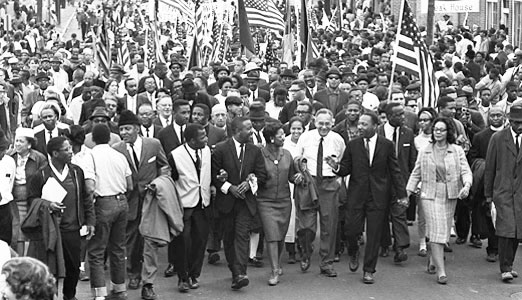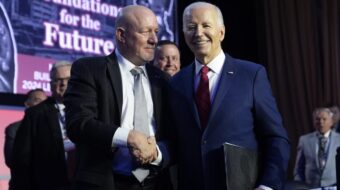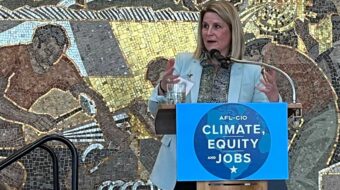
“We may be marching from Selma to Montgomery, but this is about the Wisconsins, Ohios, Indianas, Arizonas, the Michigans and any other state where they’re blatantly attacking our rights.”
With those words AFL-CIO Executive Vice President Arlene Holt Baker told reporters at the National Press Club in Washington, D.C., last week that unions are joining with civil rights and community partners in a massive re-enactment of the historic 1965 Alabama civil rights march. Holt Baker is the nation’s highest-ranking African American labor leader.
The reenactment will focus, she said, on the new attacks on voting rights across the nation by the GOP, on immigrant and workers’ rights and on education.
“The onslaught of coordinated attacks on workers’ rights, voting rights, public education and immigration reform is an affront to our democracy,” said Holt Baker. “During the difficult economic times that so many of our communities are facing, we would much rather see our state legislators spending their time focusing on job creation as opposed to deconstructing our fundamental rights.”
The five-day reenactment will step off on Sunday, March 4, in Selma, in remembrance of “Bloody Sunday” in 1965 when 600 peaceful marchers calling for the right to vote, led by Dr. Martin Luther King, were attacked by hundreds of local and state police wielding billy clubs and using poison gas on the demonstrators.
“It is important that we not just remember what Dr. King and others did in 1965 with the Voting Rights Act that came as a result of the Selma-to-Montgomery march,” said the Rev. Al Sharpton, president of the National Action Network, which is among the sponsors of the reenactment. “We must preserve it (the Voting Rights Act) against voter ID laws and the (elimination of) early voting and voter suppression attempts that are taking place today,” he said in a statement.
The original Selma-to-Montgomery march was actually three marches that were part of a massive civil rights movement taking place across America. The first march, on March 7, 1965, was the brutally attacked “Bloody Sunday” event. The second march, the following Tuesday, was turned back after some 2,500 demonstrators crossed Selma’s Edmund Pettus Bridge.
The third march started March 16 with marchers logging about 10 miles per day on their treck from Selma to the state Capitol in Montgomery. They marched along Route 80, known at that time as Jefferson Davis Highway. Davis was president of the Confederacy.
The third march made it to Montgomery and the state Capitol. The nation watched on TV as the marchers made their way, protected this time by 2,000 U.S. Army soldiers, 1,900 members of the Alabama National Guard who had been put under federal command, and huge numbers of FBI agents and federal marshals.
Many individual unions have joined the AFL-CIO in sponsoring the re-enactment including the Service Employees, Auto Workers, the American Federation of State, County and Municipal Employees and the American Federation of Teachers.
Unions and the civil rights groups involved say they they will push hard to publicize their national campaign, which began several weeks ago, to get the Alabama state legislature to dump its recently passed anti-immigrant law.
“This law is an ill-conceived effort to terrorize undocumented workers and drive them from the sate,” Wade Henderson of the Leadership Council on Civil Rights, which is coordinating this year’s march, said in a statement.
Immigrant families have fled Alabama because of the new law with children having been pulled out of school by officials forced to quiz them about their citizenship.
The law also forces police to stop, quiz and demand papers from and arrest for deportation anyone who “looks different.”
It also criminalizes anyone signing a contract with, selling or renting a house to, or giving any type of aid, including a glass of water, to undocumented workers.
The sponsoring groups say they hope the march will help force corporations to re-think doing business in Alabama. They have already asked three top automakers in the state – Honda, Hyundai and Daimler Benz – to meet with them about the law. Henderson announced those plans at a Feb. 6 news conference.
The United Auto Workers played a leading roll in supporting the civil rights movement in the 1960s. The union’s current president, Bob King, said the UAW “will enlist our members, have demonstrations, and do whatever we collectively decide to help overturn the Alabama law.”
Eliseo Medina, SEIU’s secretary-treasurer, said his union has few members in Alabama, “but they are participating in efforts” to lobby the legislature to overturn the law. “We’ll mobilize them to participate” in the Selma-to-Montgomery march, he added. “You can’t have people living in the shadows without impacting all other workers,” Medina said of the immigrant workers targeted by the Alabama law.
Photo: Dr. Martin Luther King leads marchers across the Alabama River on the first of a five-day, 50 mile march to the state capitol on March 21, 1965. AP

MOST POPULAR TODAY

Hold the communism, please: SFMOMA’s Diego Rivera exhibit downplays artist’s radical politics

‘Warning! This product supports genocide’: Michigan group aims to educate consumers

After months of denial, U.S. admits to running Ukraine biolabs

Ohio: Franklin County treasurer attends Netanyahu meeting, steps up Israel Bond purchases

“Trail of Tears Walk” commemorates Native Americans’ forced removal






Comments